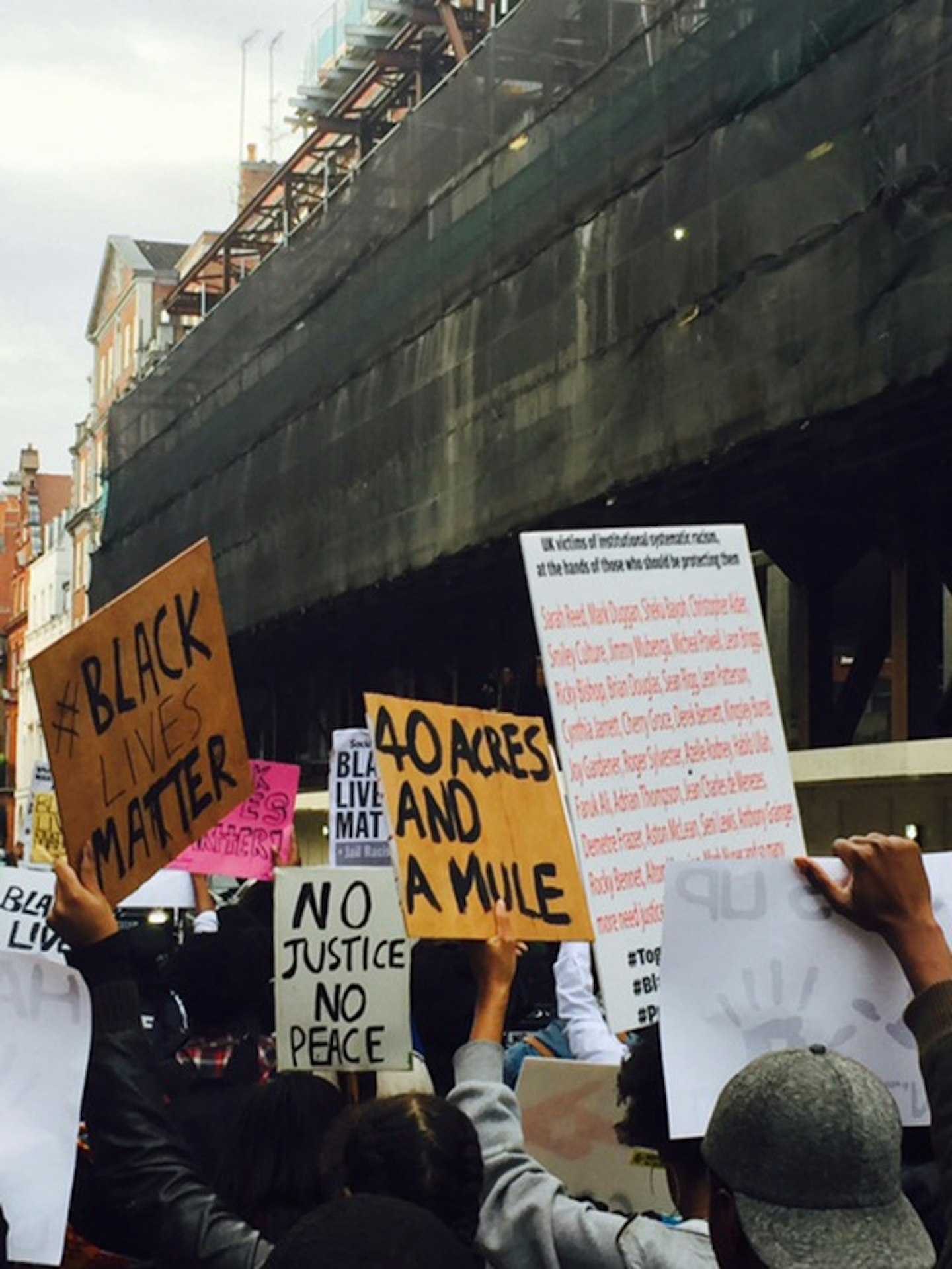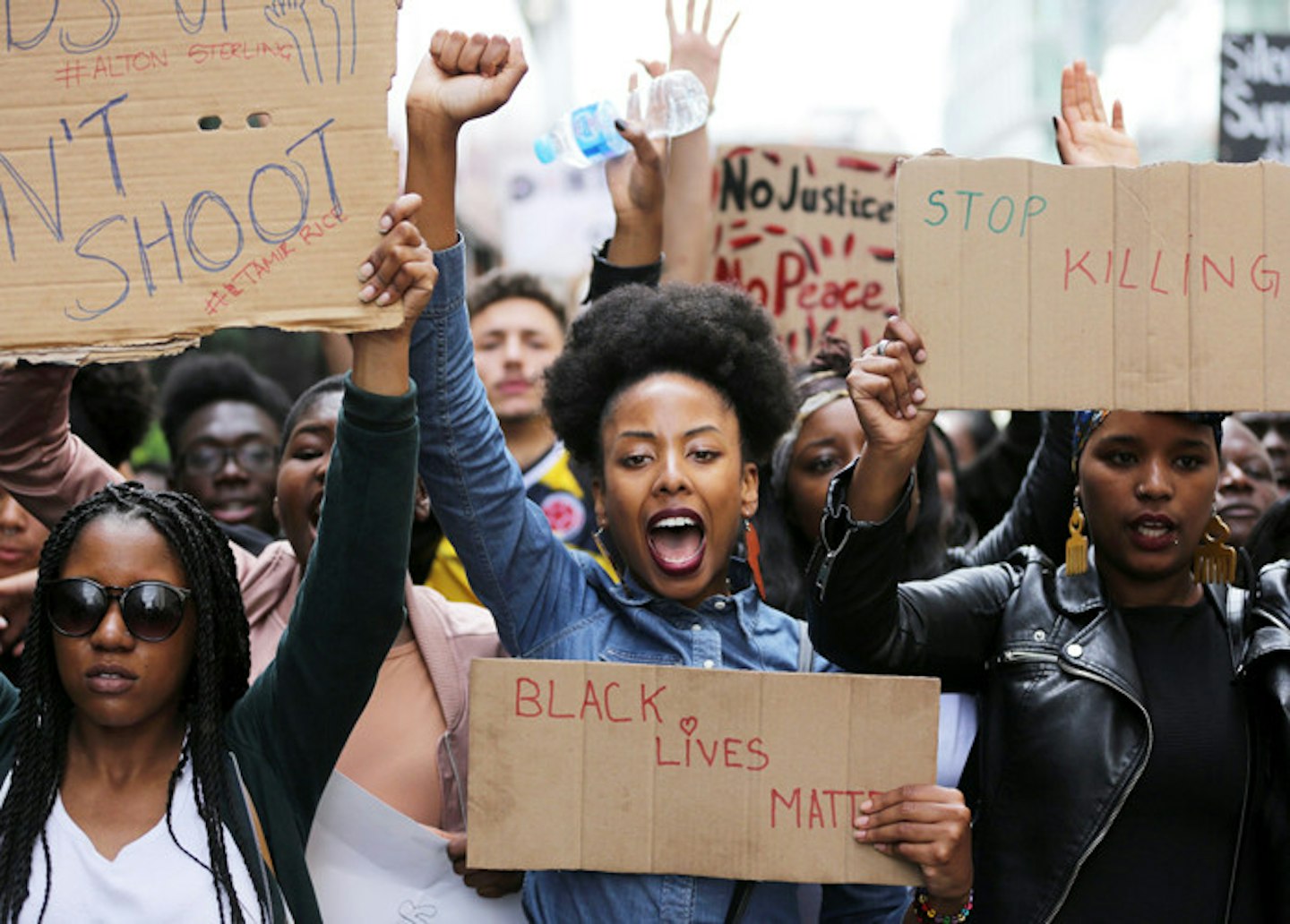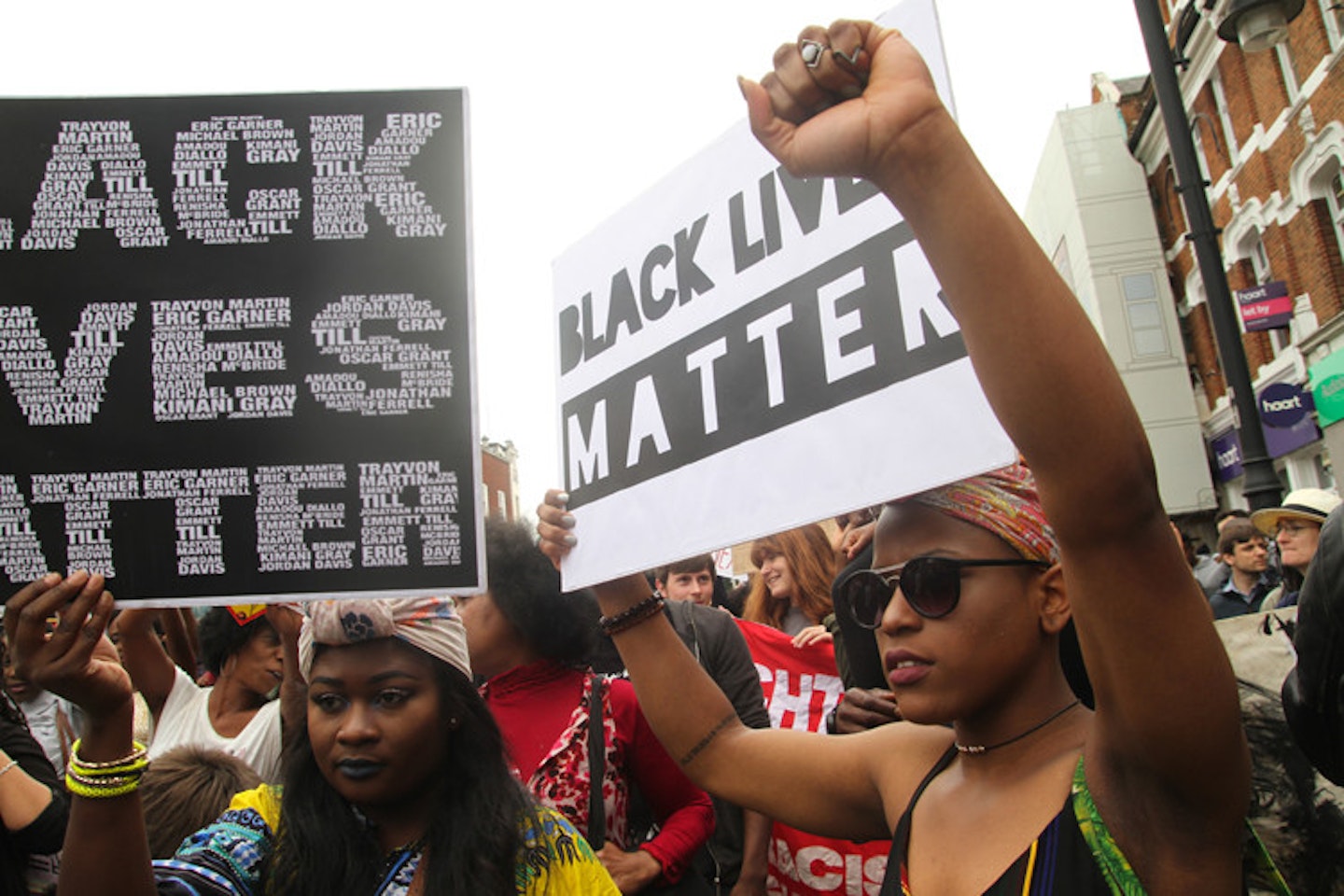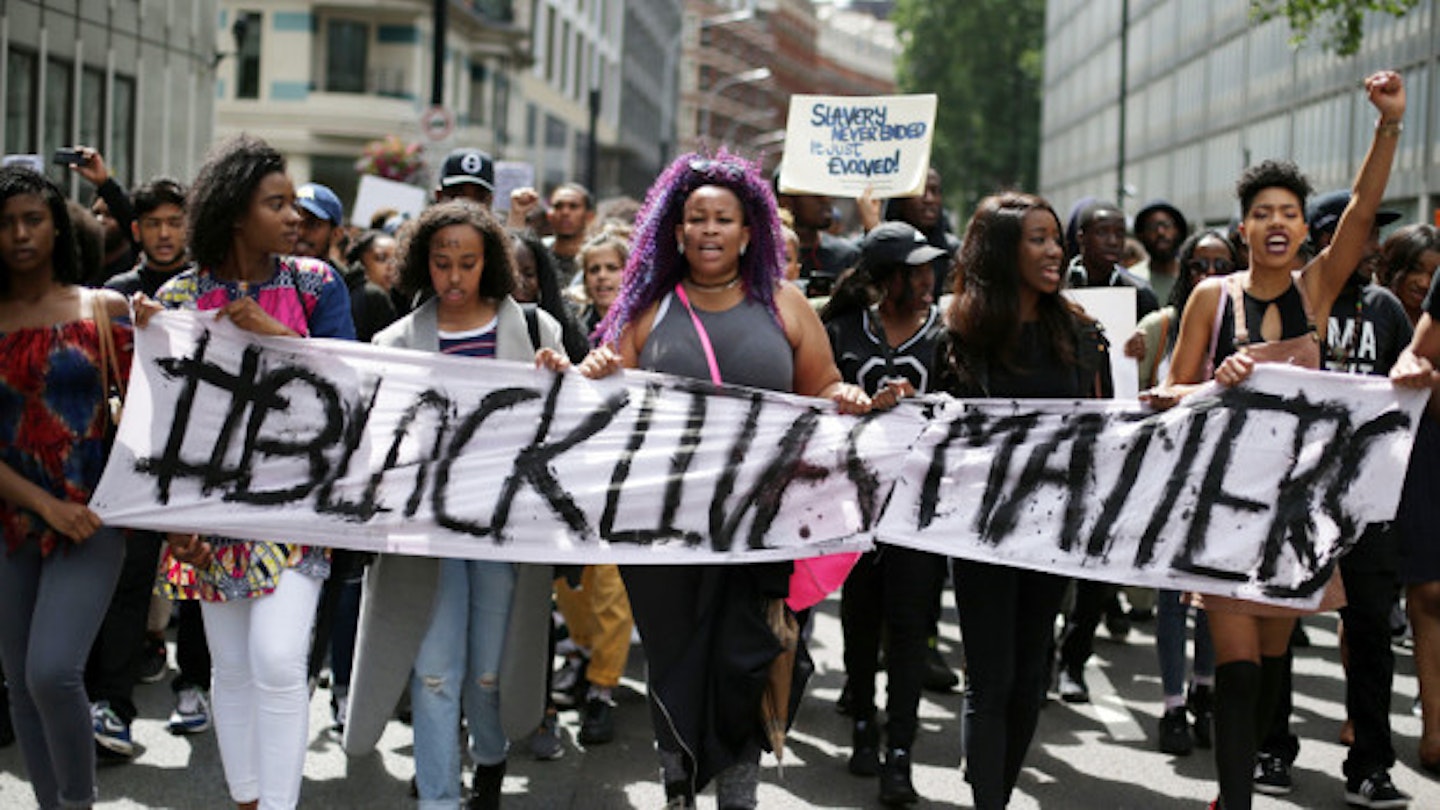'America is an exaggerated version of everything that happens in the UK' says Ayishat Akanabi, co-organiser of London's Black Lives matter protests. 'In the UK, things are more covert, which is testament to the British reserve in general. Americans are a lot more out-going and louder than us and in a way more proud to be brash, that’s why these racial injustices are exposed so openly.'
Since last Friday Black Lives Matter protests have caused road blacks across London. They were responses to the deaths of Alton Sterling in Louisiana and Philano Castile in Minnesota, two black Americans killed by police officers. The incidents have revived anger and frustration about police brutality and racial discrimination. And there will, undoubtedly, be further protests this weekend in Liverpool, following the death of Mzee Mohammed, 18, yesterday in Merseyside. The cause of his death has not yet been confirmed but he died whilst in police custody.

Speaking with Ayishat makes me consider that over the last two years, I have lost count of the number of videos I have watched where black men, women, boys and girls have either been brutally attacked, or murdered at the hands of police. I can’t remember exactly when I started using the hashtag #blacklivesmatter, but I am certain that the hashtag is one of, if not, the most used hashtag among my social media posts.
Yet, last week the words 'black lives matter', never rang more untrue with the back to back deaths of Sterling and Castile. These tragedies like many others, were caught on camera, with Castile’s death being live streamed on Facebook by his girlfriend. Like previous videos of black men and women dying at the hands of white men in uniforms it illustrated that, while time has moved on, the atitudes towards and value placed on black lives has not. History textbooks recount, biographies document, witness accounts testify and grainy black and white footage show us this. African Americans are still in a position where their lives can be taken away in a flash, their murderers usually not facing any consequences.
The hashtag and movement #blacklivesmatter doesn't just mourn the African Americans who have lost their lives due to police brutality. The Black Lives Matter movement is more than that; it highlights systematic racism that is perpetuated by the criminal justice system. It also demands reform, so that black Americans can live a life where they do not fear the very people who are meant to protect them. This unfair justice system is why black drivers in America are three times as likely to be stopped and searched during a traffic stop, compared to their white counterparts. It is why in 2015, young black men were nine times as likely to be killed at the hands of a police officer compared to any other Americans. It also why in 2014, a study showed that while African Americans make up 13% of the country's population, they make up 40% of the prison population, meaning that African Americans make up a disproportionate number of criminals serving prison sentences.

Many may look at the viral videos of violence and the statistics pointed out and believe that black British women and the black British community as a whole, are compelled to protest and speak out against America’s injustices simply because we share the same skin tone. Some may feel that the London based Black Lives Matter protests which took place over the weekend happened because the black British community buy into the 'special relationship' between the US and UK. However, America’s problems are our problems. We know that, like African Americans, black Britons are also over-policed in comparison to our white counterparts and that those who are black British or those from a BAME backgrounds are more likely to die when placed in police custody.
In fact, a study which analysed all stop and searches between 2014-2015 discovered that black people in the UK were over four times more likely to be stopped and searched. Furthermore, as in the US, black people in the UK make up a disproportionate amount of the prison population in comparison to how many black people live in the country. Research by the Equality and Human Rights Commission, showed that blacks made up 10% of the prison population, but only 3% of the actual population.
So, while we may sit at home and look on in judgement of America and how it treats those of a darker skin tone, like armchair activists, we must acknowledge that we too have structural racisim within our own justice system.
It is these statistics, coupled with America’s problems that pushed Ayishat to organise London's Black Lives Matter protests. 'The same racial injustices that are happening in the US are happening in the UK' she says. 'Yes, those that have died in the UK may not have been shot by the police, but they have died in police custody. Sarah Reed died in police custody earlier this year. Police brutality is happening here, it is just happening on a smaller scale; or, should I say, a quieter scale.”
Sarah Reed isn’t the only black person to have died in police custody. Since 1990, over 1500 people have died in police custody and people of colour make up a third of those victims, even though they only amount to 14% of the population.
While there is no escaping the fact that Britain is no better than America in police treatment of black people, for many black British women, the Black Lives Matter movement is an act of prevention and protection towards the black men that we know and love. Whether we look back through British history, assess statistics or watch British TV shows and films, young black British women see their boyfriends, fathers, brothers and future sons cast as criminals more often than law abiding citizens when they are actually cast at all.
Black British women know that we could be the girlfriend of Philando Castile. Our policemen don’t carry guns, but in this country black men are more likely to walk into police cells and, statistically speaking, less likely to walk out of them alive than white men. We know deep down that the hurt and pain that black Americans feel could one day be our pain. That’s why black British women feel so passionate about the Black Lives Matter movement, because we also know that our lives here matter less based on our skin tone.

For us, this fight against injustice isn’t just an attempt to free black people from demonising stereotypes which place us in powerless positions, particularly when coming into contact with the law. Black Lives Matter is about protecting ourselves and voicing our struggles. Crimes and unfair police treatment against black women often goes unnoticed by our nation, unreported on by the media. Hence why some reading this may have been unfamiliar with the name Sarah Reed.
Black women aren’t seen as 'ideal' victims due to respectability politics. We’re often painted as troublesome, angry and mouthy by images still peddled by the media, TV and film. When we do encounter unfair police practices these reductive stereotypes don’t just hinder our chances of justice, they silence our right to tell our story.
Black British women understand the pain of African Americans all too well. Watching black men and black women dehumanised in their deaths by those who are meant to make us feel safe is agonising and exhausting. I can’t speak for every black British woman and do not profess too. However I do think many may share this sentiment; for us, Black Lives Matter isn’t a way to start a race war in Britain, it is a way for us to end the one that already exists.
You might also be interested in:
Do Women Of Colour Need To Be More 'White' To Secure Employment?
The Legacy Of Brexit Has Made People Of Colour Feel Unwelcome In Their Own Country
Follow Tobi on Twitter @IamTobiOredein
This article originally appeared on The Debrief.
